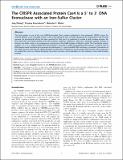The CRISPR associated protein Cas4 Is a 5' to 3' DNA exonuclease with an iron-sulfur cluster
Abstract
The Cas4 protein is one of the core CRISPR-associated (Cas) proteins implicated in the prokaryotic CRISPR system for antiviral defence. Cas4 is thought to play a role in the capture of new viral DNA sequences for incorporation into the host genome. No biochemical activity has been reported for Cas4, but it is predicted to include a RecB nuclease domain. We show here that Cas4 family proteins from the archaeon Sulfolobus solfataricus utilise four conserved cysteine residues to bind an iron-sulfur cluster in an arrangement reminiscent of the AddB nuclease of Bacillus subtilis. The Cas4 family protein Sso0001 is a 5' to 3' single stranded DNA exonuclease in vitro that is stalled by extrahelical DNA adducts. A role for Cas4 in DNA duplex strand resectioning to generate recombinogenic 3' single stranded DNA overhangs is proposed. Comparison of the AddB structure with that of a related bacterial nuclease from Eubacterium rectales reveals that the iron-sulfur cluster can be replaced by a zinc ion without disrupting the protein structure, with implications for the evolution of iron-sulfur binding proteins.
Citation
Zhang , J , Kasciukovic , T & White , M F 2012 , ' The CRISPR associated protein Cas4 Is a 5' to 3' DNA exonuclease with an iron-sulfur cluster ' , PLoS One , vol. 7 , no. 10 , e47232 . https://doi.org/10.1371/journal.pone.0047232
Publication
PLoS One
Status
Peer reviewed
ISSN
1932-6203Type
Journal article
Collections
Items in the St Andrews Research Repository are protected by copyright, with all rights reserved, unless otherwise indicated.

